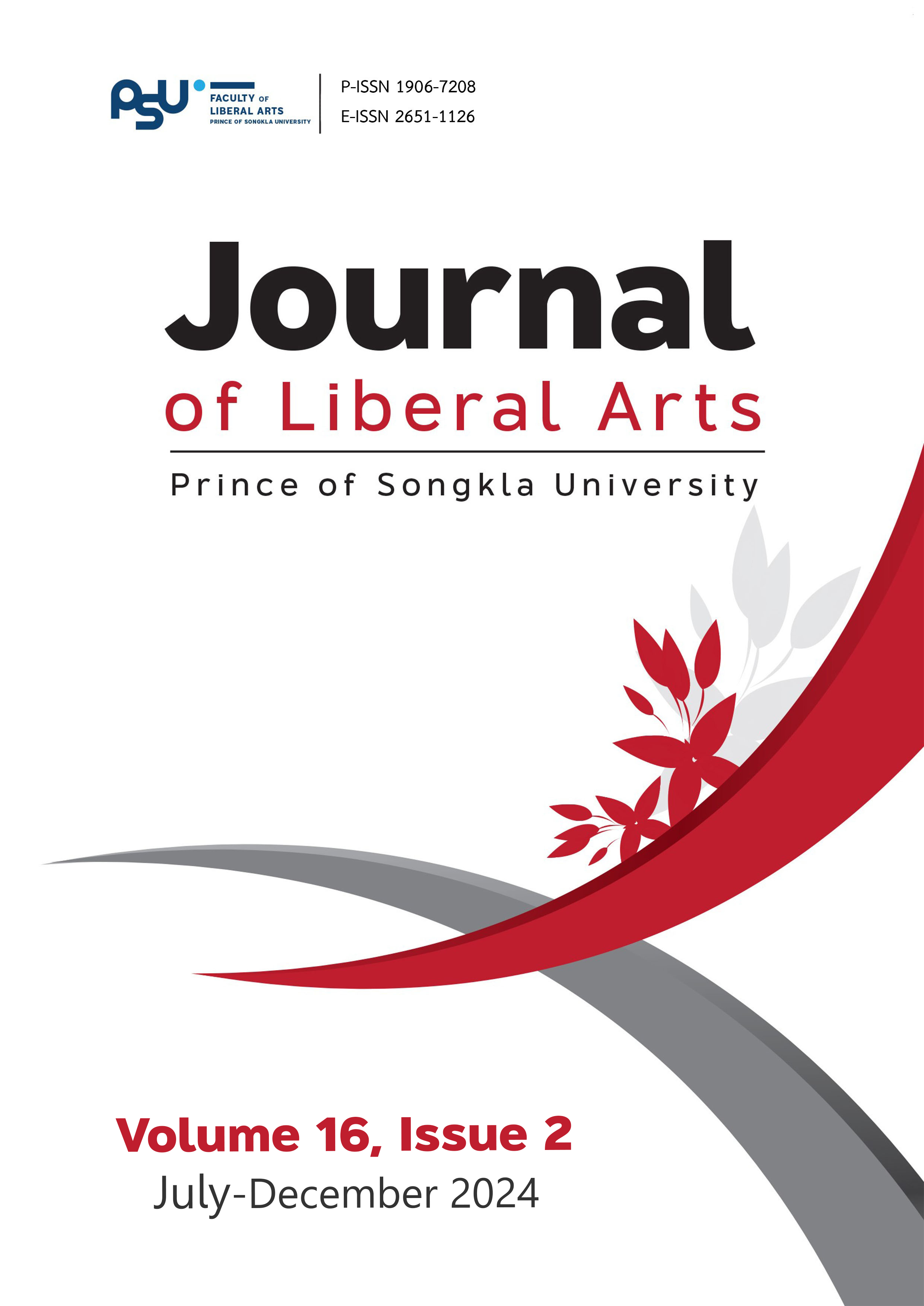The Romance of the Three Kingdoms: Exploring the Wisdom about Content and Roles in the Chao Phraya Phraklang (Hon) Edition
DOI:
https://doi.org/10.14456/jlapsu.2024.9Keywords:
The Romance of the Three Kingdoms (RT3K), The Chao Phraya Phraklang (Hon) Edition, Wisdom, Content, RolesAbstract
This research article aims to explore the wisdom about content and roles within the literature of “Romance of the Three Kingdoms,” particularly the Chao Phraya Phraklang (Hon) Edition. It utilizes the concept of content and analysis of the narrative; drawing upon data from “Romance of the Three Kingdoms” (hereinafter referred to as “RT3K,” as presented in this specific edition. The study found that the intellectual content in the literature of RT3K, Chao Phraya Phraklang (Hon) Edition, comprehensively covers various aspects of cultural life, including birth rituals, naming ceremonies, ordinations, marriages, funeral rites, teachings, beliefs, housing construction, occupations, the invention of tools, entertainment, and astrology. Furthermore, the responsibilities associated with this intellectual discourse include roles in education, the explaination of traditions, the impartation of moral lessons, and the promotion of tourism.
References
Bascom, W. (1953). Folklore and anthropology. The Journal of American Folklore, 66(262). http://www.jstor.org/stable/536722
Boonkhoom, K. (2016). Watchanalila lae botbat nathi khong bot phleng luk thung. (in Thai) [Wordplay and the roles of luk thung songs]. [Unpublished master’s thesis]. Chiang Mai Rajabhat University.
Chao Phraya Phraklang (Hon). (2012). Samkok. (in Thai) [Romance of the Three Kingdoms]. (2nd ed). Saeng Dao Publishing.
Chanthao, R. (2016). Phonlawat khong botbat nathi prapheni kan Khaeng Ruea Yao nai phak Isan. (in Thai) [Dynamics of roles and traditions of long boat racing in the Northeastern region]. Journal of Humanities and Social Sciences. 33(3), 115-134.
Charoenchittrakarm, P. (2008). Phum panya nai wanna kam. (in Thai) [Wisdom in Literature]. Journal of Arts, Thammasat University. 8(1).
Chinnoon, P. (2016). Phum panya kan sang san thang sun thari ya khong khon thai chak wannakam kham son phak klang yuk kan phim pho so 2459-2493. (in Thai) [Creative aesthetic wisdom of Thai people from central literature during the Printing Era (1916-1950)]. Journal of Humanities and Social Sciences, Khon Kaen University, 39(2).
Chuaybamrung, U. (2007). Sueksa phum panya chao ban thi prakot nai wannakam thong thin. (in Thai) [A Study of local wisdom reflected in local literature]. [Unpublished master’s thesis]. Srinakharinwirot University.
Nakornthap, T. (1995). Khumue khru phasa Thai tho 401 tho 402 chut wan na san wi chak chan Mat tha yom sueksa pi thi 4 (chabapprapprung). (in Thai) [Thai language teacher’s manual T401 T402, literary criticism set for grade 10] (Revised Edition). Department of Academic Affairs, Ministry of Education.
Na Thalang, S. (2014). Thitsadi khatichon witthaya withi witthaya nai kan wikhro tamnan nithan phuenban. (in Thai) [Theory of anthropology: Methodology in analyzing folk legends]. (3rd ed). Chulalongkorn University Press.
Nimmanheminda, P. (1994, March 23-24). Phum panya Thai nai withi Thai. (in Thai) [Thai wisdom in Thai ways] [Seminar]. Thai wisdom in language and literature, the Santimaitri Building, Government House, Bangkok, Thailand.
Office of the National Education Commission. (1993). Khwammai lae khopkhai ngan Watthanatham phuenban. (in Thai) [Meaning and scope of folk culture work]. Teachers Council.
Pathanothai, W. (2000). Samkok chabap plaemai. (in Thai)[Romance of the Three Kingdoms, new translation]. (7th ed.). Sukhaphap Jai.
Phra Akaradech Yantatesho. (2016). Phut tha withi. (in Thai) [Buddhist methods of teaching By Lord Buddha]. Retrieved February 12, 2023, from http://www.stou.ac.th/study/sumrit/7-59(500)
Phra Maha Chakrapong Chinmethi (Khamyotchai). (2019). naeo khit thang kan mueang khongkhongbeng nai wannakam Samkok thi mi tho prathet thai. (in Thai) [Political Concepts of Kongming in the Romance of the Three Kingdoms and Their Influence on Thai Society]. [Unpublished master’s thesis]. Mahachulalongkornrajavidyalaya University.
Rakmani, K. (1994, March 23-24). Konlawithi lae laksana kan nam sanoe nuea ha nai Wannakhadi. (in Thai) [The approaches and characteristics of presenting the literature contents] [Seminar]. Thai wisdom in language and literature, the Santimaitri Building, Government House, Bangkok, Thailand.
Saensara, A. (2018). Ni than phuen ban kap kan suep san phum panya thong thin amphoe Kaset Sombun changwat Chaiyaphum. (in Thai) [Folk Tales and the preservation of local wisdom in Kaset Sombun District, Chaiyaphum Province]. [Unpublished Doctoral dissertation]. Burapha University.
Sirimahasakorn, B. (2019). Konlayut awut khong phunam. (in Thai) [The Tactic]. Saeng Dao Publishing.
Tansakul, Y. (2015). Kan phalit Samkok nai bo ri bot khong sangkhom Thai. (in Thai) [The Production of Romance of the Three Kingdoms in the Context of Thai Society,1937-2007]. [Unpublished master’s thesis]. Thammasat University.
The Institute for Southern Thai Studies, Thaksin University. (1999). Saranukrom watthanatham Thai phak tai. (in Thai) [Encyclopedia of Southern Thai Culture] (Vol. 1 – 18). Thaksin University.
The Royal Institute. (2003). Photchananukrom chabap rat cha ban dit rat cha sa than pho so 2542. (in Thai) [Royal Institute Dictionary]. (1999 ed). Nanmee Books.
Wikipedia. (2013, June). CaoCao Mausoleum. Retrieved December 25, 2023, from https://en.wikipedia.org/wiki/Cao_Cao_Mausoleum
Downloads
Published
How to Cite
Issue
Section
License
Copyright (c) 2024 ณัฐกฤตา นามมนตรี

This work is licensed under a Creative Commons Attribution-NonCommercial-NoDerivatives 4.0 International License.
The authors retain the copyright to their article but the Journal of Liberal Arts, Prince of Songkla University reserves the exclusive rights to first publication.






